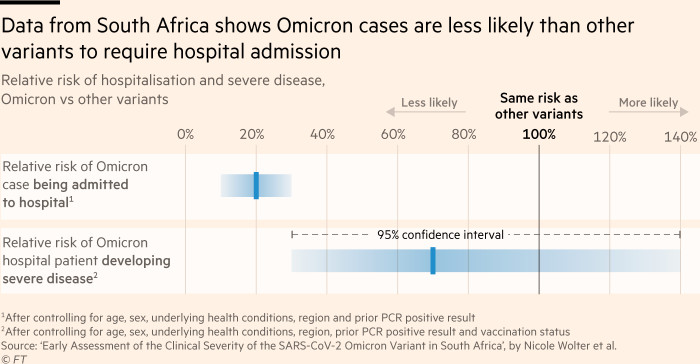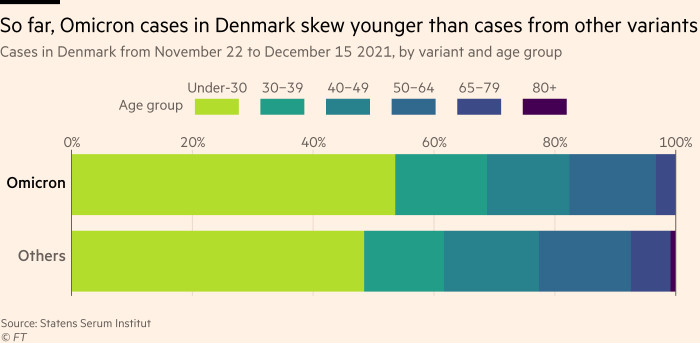Early Consensus on Omicron? Not Quite!
"There is something going on ... in terms of the difference in the immunological response for Omicron vs Delta.""[Findings suggested breakthrough infections and reinfections from Omicron were] less severe [and that immune protection from T-cells and B-cells] mediated [Omicron's] progression to severe disease [despite diminished antibody protection].""It's about what [it] means in terms of absolute numbers as, if the numbers are so big it can still cause a substantial public health problem even if, per case, the risk of severe disease is less."Professor Cheryl Cohen, epidemiologist, University of Witwatersrand, South Africa"It is primarily young and vaccinated people who are infected with Omicron, and when we adjust for this, we see no evidence that Omicron should result in milder disease."Henrik Ullum, director, Statens Serum Institut, Denmark

According to health-care data out of South Africa, Denmark and the United Kingdom, findings appear to indicate by separate research teams that fewer cases of severe disease will erupt from Omicron, despite its higher rate of infectiousness, than the previous COVID-19 iteration, Delta. Despite that finding, there remains insecurity of knowledge about the ever-mutating, ever surprising SARS-CoV-2 virus to the point that these same researchers caution that health services can still be strained owing to the new variant's high degree of infectiousness.
All are in agreement that unvaccinated groups remain the most at-risk for infection. And that the proportion of all cases developing severe disease remains lower than with other variants, despite Omicrons breakthrough infections and reinfections causing mild symptoms. Omicron now accounts for a major proportion of COVID-19 cases in a growing number of countries, including the United States. The study carried out by South Africa's National Institute For Communicable Diseases found among those who tested positive in October and November, Omicron was 80 percent less likely to be admitted to hospital than Delta cases.
The same research team released a second analysis controlling for vaccination status, finding that once admitted to hospital Omicron and Delta cases from recent weeks held similar likelihood of progressing to a serious condition. Over 10,000 Omicron cases formed the basis for the analyses, including over 200 hospital admissions. Research out of Denmark indicated that among those who tested positive between November 12 and December 15, Omicron cases appeared three times less likely for hospital admission than cases with other variants, while cautioning that outbreaks among younger groups could skew data.

Omicron -- in the absence of evidence for any intrinsic reduction in severity -- is not precluded from resulting in less severe outcomes at the population level, given that a greater share of cases are among people with some protection against severe disease through prior infection or vaccination. "Due to Omicron's higher immune evasion, this pattern will persist in a population-level assessment", explained Professor Samir Bhatt, at University of Copenhagen.
The British study analyzed data from PCR-test confirmed cases in England between Dec.1 and Dec.14, concluding that "Overall, we find evidence of a reduction in the risk of hospitalization for Omicron relative to Delta infections, averaging over all cases in the study period". According to Imperial College researchers, risk of any visit to hospital with Omicron was between 20 and 25 percent lower than with the Delta strain. Britain reported over 100,000 new cases of COVID-19 on Wednesday, the first time since wide-spread testing was available.
People who had received at least two vaccine doses remained substantially protected against hospitalization, even if protection against infection has largely been lost against the Omicron variant, according to their estimates. Denmark on Sunday introduced a suite of measures to contain Omicron's spread; among which was theatre and museum closures and capacity limits in bars, restaurants and shopping centres.
A drop-off in severity could make the decision of countries like Britain and the United States not to impose restrictions "just about tenable", according to Professor Peter Garred, clinical immunologist at Copenhagen's Rigshospitalet, Denmark's largest hospital.
 |
| Technicians in Durban, South Africa, conduct antibody testing in a laboratory at the African Health Research Institute Technicians conduct antibody testing at the African Health Research Institute in Durban, South Africa Waldo Swiegers/Bloomberg |
"[Policymakers should be a] little careful about making the narrative that it's more mild [because it would be] some weeks [before the variant's impact on hospitals becomes clear].""I fear that because of the infectiousness of Omicron ... what we see right now will be very different n just about two weeks' time."Professor Thea Kolsen Fischer, head, virus and microbiological specialist diagnostics, Staten Serum Institut, Denmark
Labels: Denmark, Hospitalization, Infectiousness, Omicron, SARS-CoV-2, Severity, South Africa, Studies, United Kingdom

0 Comments:
Post a Comment
<< Home